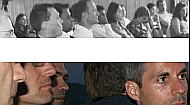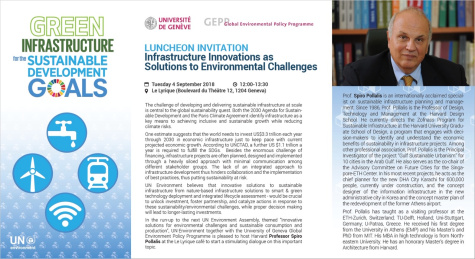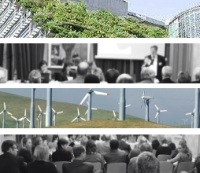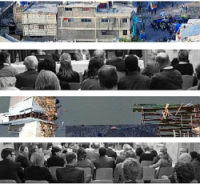

There is an urgent need to address the linkages between these problems and to forge a more comprehensive understanding of the emerging challenges, as well as their interconnected impacts, while developing an innovative perspective. Against this backdrop, the GEPP Policy Dialogues are designed to create a platform for trans-disciplinary and cross-sectoral debate by convening globally renowned thinkers, academics and scientists with the Geneva public and private actors aiming to generate a community of learning and practice.
Video of the GEPP Policy Dialogue on SDGs (2/09/2015)
Infrastructure Innovations as Solutions to Environmental Challenges
Environment House, Geneva, 4th September 2018, 12:00 - 13:30
GEPP Co-organized with UN Environment the session on Infrastructure Innovations held by prof. Spiro Pollalis from Harvard University. The session explored in detail the potential of the latest good practices in infrastructure design and management to address SDG-related challenges.

Panelists
Prof. Spiro Pollalis, Zofnass program, Harvard University
Mr. Fulai Sheng, United Nations Environment
Moving Forward: Challenges for Sustainable Development Goals (SDGs) at International and National Levels
Geneva, Wednesday 11th September 2013, 16.00-19.30
The 68th session of the UN General Assembly that starts in September 2013 will be an important milestone in the definition of Sustainable Development Goals (SDGs), following the outcomes of Rio+20 and in the framework of the Post-2015 Development Agenda. The Report of the High-level Panel of Eminent Persons released in May, as well as the outcomes of the four sessions of the Open Working Group on SDGs conducted in the first half of 2013 illustrate the complexity of this ambitious process. The aim of this Policy Dialogue is to evaluate the progress made in the definition of SDGs and to discuss the difficulties and opportunities to set up a common, universal, agenda in order to address and monitor global challenges. The diversity of the speakers from developed and developing countries, representing governments, international organisations and civil society, will fertilize the debate.
• How can goals that really enable progress torward sustainability be formulated?
• How can common goals that address the concerns of both developed and developing countries in a single global agenda be defined?
• What are the risks and advantages of a unified framework?
• How can a universal agenda be easily understood by stakeholders in civil society while being pertinent, applicable and measurable?
• What lessons can be learnt from the achievements and limitations of MDGs?

Presentation by Ambassador Michael Gerber, Swiss Agency for Development and Cooperation (SDC), Bern. Ambassador Gerber is the Special Representative of Switzerland for international negotiations on Sustainable Development in the post-2015 Agenda.
Panelists
Ms. Sylvie Motard, United Nations Environment Programme, Geneva
Mr. Vicente Paolo Yu, Global Governance for Development, South Centre, Geneva
Millennium Development Goals: Measuring Progress Towards Social Justice
WHO Headquarters, Geneva, 24th April 2012
This Policy Dialogue will be organized in partnership with the World Health Organization in Geneva. It will consider the potential for giving a higher profile to health in the debate and follow-up to the Rio+20 Conference. The reason for this is that health has not been a high priority during the last 20 years despite its pivotal place in the Rio Declaration adopted in 1992. This Policy Dialogue will consider how synergies between health and other priorities, such as renewable energy consumption, or the green economy, can be strengthened by reconsidering the Millennium Development Goals . It is argued that measurable health targets can be a useful way of reforming governance on sustainable development because health indicators are good measures of social progress to reduce inequalities and inequity.
In the context of the upcoming Rio+20 Conference, the aim of the Policy Dialogue is to discuss the opportunity for a shift to a green economy and the policy frameworks needed to implement it. A closer look at the Millennium Development Goals will also give the opportunity to assess the relevance of launching new Sustainable Development Goals in Rio.
What are the achievements and shortcomings of the Millennium Development Goals?
How can the monitoring of MDGs be enlarged to measure progress towards social justice?
Which lessons should be learnt from the MDGs for the forthcoming Sustainable Development Goals?
The policy dialogue will be chaired by Doctor Carlos Dora (Department of Public Health and Environment, World Health Organization, Geneva). Two invited speakers will set the framework by 15-20 minute presentations.
The first speaker will be Madam Anne Hassberger (Regional Health Advisor for Eastern Europe, Swiss Agency for Development and Cooperation, Bern) who will present a review of the Millennium Development Goals from the perspective of Switzerland.
The second speaker will be Professor Jaya Krishnakumar (Department of Economics, University of Geneva) who has a strong social-economic concern for measuring and addressing inequity and social justice.
Agenda
18.00 Welcome
18.15-19.00 Introduction by Chair
Presentations by each speaker
19.00-20.00 Policy dialogue and discussion with the audience
20.00 Cocktail
Location
World Health Organization, Avenue Appia 20, Geneva

The financial and economic crises have spurred intense debates on the functioning of our economic systemand its role in achieving society’s wellbeing.
Massive Government interventions to sustain economic activities have included investments in renewable energy technology and infrastructure, some organizations even calling for a “GreenNewDeal”.
More general, there is awidespread discussion onwhether production and consumption patterns could be re-directed towards reducing the use of resources, wastes and pollution,while at the same time diversifying the activities in environmental sectors to generate new employment opportunities and reduce inequalities.
Advocates of a green economy call on the public and private sectors for considerably increasing investments in selected ‘green’ sectors and for implementing environmental tax reforms, also to reduce dependency on fossil fuels. Sceptics point out that environment is not necessarily a top priority inmost countries and that employment and poverty could bemore effectively tackled through other interventions.
The aim of the Policy Dialogue is to discuss the opportunity for a shift to a green economy and the policy frameworks needed to implement it.
Invited Speakers : Dr Steven STONE (Chief, Economics and Trade Branch, United Nations Environment Programme), Prof. Lucas BRETSCHGER (CER-ETH - Center of Economic Research).
Chairman : Prof. Andrea BARANZINI (Geneva School of Business Administration).

Policy Dialogue 3 | Environmental ethics: Who is at risk?
Geneva | May 26th 2011
How to prioritize ethical values such as freedom, justice, and sustainability in case of value conflicts?
How to reconcile environmental sustainability and risk?
How to use ethical investments and shareholder responsibility in implementing Rio+20 goals?
How to implement key ethical environmental principles in respect to vulnerability and risk processing?
About the issues to be addressed at the GEPP Policy Dialogue

Global Environmental Policies have to deal increasingly with conflicts of interests and priorities. These are conflicts of values impacting production of risk and their processing. Such ethical questions and dilemmas have to be clarified in order to make progress in international environmental policy-making and risk management.
Should stronger environmental norms have priority over freedom of trade? Does economic growth supersede social justice? Do the limits of participatory decision-making and consensus building justify a top down approach in regards to the environment?
Natural resource depletion, environmental pollution and technological disasters are jeopardizing biodiversity and environmental health and sustainable growth. Existing risk transfer mechanisms offer the possibility to externalize environmental damage.
What limits exist for the insurability of irrecoverable environmental losses? Overall, the fundamental question which remains is how to achieve ethical solutions while promoting good risk processing practices.
The goal of this Policy Dialogue is to address these questions and engage an integral risk management analysis while taking into consideration the impacts of risk processing on human safety, health, security and environment.
Invited Speakers
Dr Walter AMMANN, Founder, President and CEO of the Global Risk Forum GRF Davos, a Think Tank focused on risk reduction, disaster management and climate change
Prof. Denis MULLER Professor of Ethics, Universities of Geneva and Lausanne.
Chairmen
Prof. Christoph STUCKELBERGER (Founder/Director of Globethics.net and Professor of Ethics at the University of Basel)
Mr.Randall KRANTZ (Director, Environmental Initiatives,World Economic Forum)

